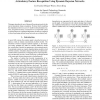Free Online Productivity Tools
i2Speak
i2Symbol
i2OCR
iTex2Img
iWeb2Print
iWeb2Shot
i2Type
iPdf2Split
iPdf2Merge
i2Bopomofo
i2Arabic
i2Style
i2Image
i2PDF
iLatex2Rtf
Sci2ools
154
click to vote
CSL
2007
Springer
2007
Springer
Articulatory feature recognition using dynamic Bayesian networks
This paper describes the use of dynamic Bayesian networks for the task of articulatory feature recognition. We show that by modeling the dependencies between a set of 6 multi-leveled articulatory features, recognition accuracy is increased over an equivalent system in which features are considered independent. Results are compared to those found using artificial neural networks on an identical task.
Articulatory Feature Recognition | Articulatory Features | Automated Reasoning | CSL 2007 | Dynamic Bayesian Networks |
Related Content
| Added | 13 Dec 2010 |
| Updated | 13 Dec 2010 |
| Type | Journal |
| Year | 2007 |
| Where | CSL |
| Authors | Joe Frankel, Mirjam Wester, Simon King |
Comments (0)

